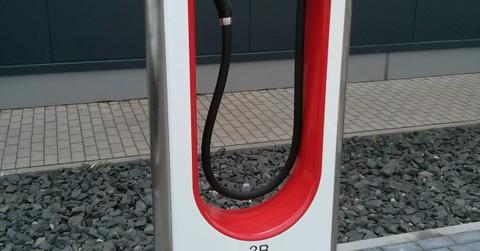Why Elon Musk Doesn’t Need to Be Tesla’s CEO
On Thursday, James Anderson of Baillie Gifford did an interview with Manager Magazin. Anderson discussed why he thinks Tesla could work without Musk.
Aug. 23 2019, Published 7:39 a.m. ET

On Thursday, James Anderson of Baillie Gifford did an interview with Manager Magazin—a German magazine. Baillie Gifford is Tesla’s (TSLA) largest shareholder after CEO Elon Musk. During the interview, Anderson explained why Tesla remains a long-term bet, what Musk can learn from Amazon (AMZN), and where Musk’s weaknesses lie. Anderson also discussed why he thinks Tesla could work without Musk.
Top investors discussed Elon Musk
Baillie Gifford owns 7.5% of Tesla. The company is Tesla’s largest outside shareholder. Musk still holds the largest number of shares at about 20%. Livemint quoted Anderson and said that he “does not think Elon needs to be CEO.” In the interview, Anderson said, “His micro-management also includes the desire to speak to the stock market and the world in ways we do not necessarily consider helpful.”
Elon Musk’s controversial tweets
Anderson is likely referring to Elon Musk’s tweets, which have often got the company and himself in trouble. The most controversial tweet was on August 7, 2018. Musk said, “Am considering taking Tesla private at $420. Funding secured.” He ended up in legal trouble with the SEC (Securities and Exchange Commission). Ultimately, Musk stepped down as Tesla’s chairman. He also tweeted about Tesla’s 2019 guidance in February 2019. The SEC said that the tweet was misleading and violated the previous settlement.
Impatient with analysts and short-sellers
Other misadventures for Tesla’s CEO include losing his cool with analysts and short-sellers during the first-quarter earnings call. During Tesla’s first-quarter earnings call, Elon Musk chided sell-side analysts. He said, “Excuse me. Next. Boring bonehead questions are not cool. Next?” After the conference call, Tesla stock turned negative due to Musk’s approach.
Tesla’s high profile executive departures
Another sticking point for the company has been several high-profile executive departures in the last few months. On August 21, Electrek reported that Stuart Bowers, the head of Tesla Autopilot, left the company due to restructuring. Along with disappointing second-quarter results, the announcement of Chief Technology Officer J.B. Straubel’s departure put pressure on Tesla’s stock price. About six months before Straubel’s departure, Musk announced the departure of Tesla’s former CFO, Deepak Ahuja, during the company’s fourth-quarter earnings call. The announcement triggered a huge sell-off in Telsa’s stock price.
Most executive departures
A Bloomberg report, citing a Bernstein analyst, said that Tesla’s executive turnover is higher than other technology companies. The problem is even more acute among the individuals reporting to Musk. Bernstein analyst Toni Sacconaghi said that Tesla changes about 27% of its top executives on an annual basis. Sacconaghi benchmarked Tesla against seven companies. Notably, Tesla has the highest executive departure rate among the companies. He said that Lyft (LYFT) and Snap (SNAP) also have similar turnover levels.
Rusch discussed Musk as Tesla’s CEO
Several experts weighed in about Anderson’s views on CNBC’s Closing Bell. While answering if Tesla could survive without Elon Musk as the CEO, Oppenheimer’s Colin Rusch said, “it could.” He also said, “at this point, the strategy for the company is well in hand and been implemented and so if they brought in someone else that could use the vision that Musk has set forth and tap in to him for additional color and then execute in a more focused way, I think shareholders would be quite pleased.” However, Rusch acknowledged that this probably won’t happen. According to CNBC, Anderson also criticized Musk for not being able to do team-building. Reportedly, Anderson asked Musk to learn from Amazon’s (AMZN) Jeff Bezos.
Ron Baron, another long-term Tesla bull, said in his latest interview with CNBC that some of Tesla’s troubles are Elon Musk’s “self-inflicted wounds.” Baron is still bullish on the company. To learn more about Baron’s views on Musk and Tesla, read Why Ron Baron Remains a Firm Long-Term Tesla Bull.
Many supporters
However, Anderson said that he supports Musk. He would just like the CEO to stop micro-managing things. In March, Anderson talked to Barron’s. He said, “We wouldn’t be against him having a different role.” Anderson said, “I don’t think he needs to be CEO.”
While Tesla might be able to survive without Elon Musk as the CEO, it would certainly make a lot of shareholders unhappy. Many shareholders stayed with the company due to Musk’s vision and charisma, which have been positive for the company. After Musk’s controversial tweet last August, there were speculations that he might have to leave Tesla. Many investors and analysts were shocked. According to CNN, Garrett Nelson, an analyst with CFRA, downgraded Tesla stock to a “sell” rating. He said that the threat of Musk’s departure should be a deal-breaker. He also said, “Without a doubt we think [Musk leaving] would be a negative. We think he’s a genius. He’s a visionary.”
